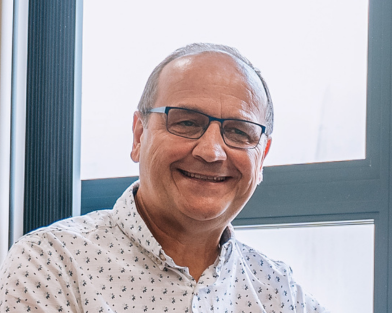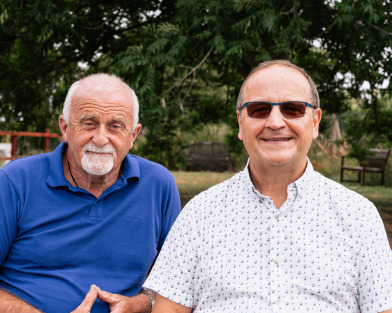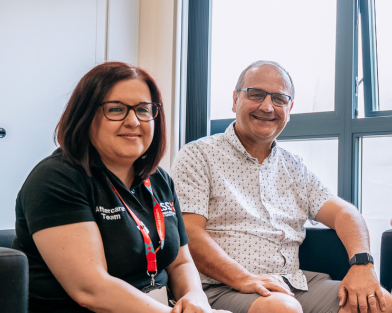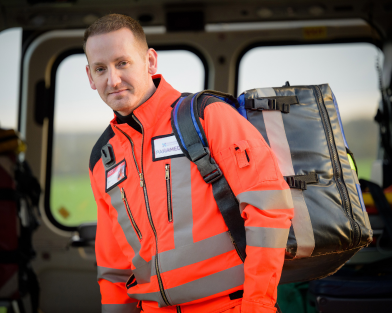“On 4 March 2023 I had a cardiac arrest while I was out cycling with my club, Sidcup Cycles. Thank goodness there were people around me who knew how to do CPR and use a defibrillator, or I wouldn’t be here now.
As usual we’d gone out at eight thirty on a Saturday morning to do 40 or 50 miles. Usually, we’d ride out to somewhere in the Kent countryside with a stop halfway for a coffee break.
The ride had been going well until we reached Pease Hill near Sevenoaks at about 15 or 20 miles.
I don’t remember what happened, but I later learned that I suffered a cardiac arrest and I ended up leaning against a bush while still on my bike, which made it hard for the people around me to work out what had happened as it looked like I was still trying to ride the bike.
Tina the ride leader, is a retired midwife and used to do CPR training for St John Ambulance. With help from other riders, she unclipped me and got me off the bike. She knew what she was doing and did a very good job. I suffered a couple of broken ribs but without Tina, a friend of mine called Alan, and the others who gave me CPR, I wouldn’t be here.
They called 999, started chest compressions and someone who knew that there was a defibrillator round the corner went to get that. Then a paramedic arrived and used his defibrillator which, after one shock, restarted my heart.
Shortly after, the crew from KSS arrived. They treated and cared for me before they flew me to the William Harvey Hospital in Ashford for further specialist cardiac care.”
KSS Paramedic Craig Prentice was part of the team that treated Jon at the scene:
“When we learned from Carol, our Helicopter Emergency Medical Service (HEMS) Dispatcher, who coordinates our lifesaving missions from the South East Coast Ambulance Service (SECAmb) Emergency Operations Centre that we were on our way to a man in his fifties in cardiac arrest, I was hoping that someone was already there, capable of giving him immediate CPR because we know that the sooner people get CPR, the better the outcomes are.
We arrive quickly with all the advanced lifesaving care we offer to give the best chance of survival, but our patients’ chances increase if people at the scene have already done their bit. That means immediately calling 999, starting CPR and locating, and using, a defibrillator.
Because of the care he’d received before we got there Jon’s heart had, thankfully, been restarted and he was breathing for himself. We refer to this as ROSC, or return of spontaneous circulation. This meant he was potentially going to do very well.
We decided to anaesthetise him and get him off to sleep so we could manage his breathing. We also needed to put him on a Lucas machine, which provides mechanical CPR, so that if he had another cardiac arrest we could resuscitate him really effectively.
We put an arterial line into the artery in his wrist so we could continuously monitor his blood pressure with every beat of his heart and gave him a medicine to increase and maintain his blood pressure.
In a rare coincidence, when we were making our approach to land at the William Harvey Hospital helipad, our second crew on duty that day were already there completing the handover of another patient, Martyn Wood, who had experienced the same medical emergency as Jon just miles and minutes apart.
Carol our Dispatcher, skilfully coordinated our other helicopter taking off so that we could land promptly just moments later with Jon.
Jon picks up the story:
“I woke up about 24 hours later. When I realised I was in a hospital in Kent, it didn’t make any sense to me. Each time the medical staff explained it to me, I’d forget and they would have to explain it again.
I was in hospital for nine days or so. After the intensive care unit, I was in a cardiac recovery ward for the rest of the time.
Martyn Wood came onto the cardiac ward a day or two later. Our families had already met in the waiting room. I think Martyn’s family heard mine talking about me and said it felt like they were talking about the same person as our stories were so similar. It’s nice to have someone that really gets what you went through.
My recovery was very quick and there have been no real side effects to speak of other than one which I only found out recently. Because of the way my brain has been affected I can’t do karaoke anymore! I can read the words and sing them, but I don’t process them quickly enough.
Craig Prentice: I’ve been part of the lifesaving crews here at KSS for ten years and I have never heard of two cases like Jon and Martyn: two men of similar ages that had both had cardiac arrests while out exercising, just a few minutes and a few miles apart, were treated in the same hospital and have since become great friends. Two lives saved and two families kept together by the people who stepped forward to help immediately, the SECAmb paramedics, KSS and the onward care they received at hospital. Thankfully both Jon and Martyn are now able to help others by sharing their stories.”
CPR and defibrillators
I was very lucky that there were people around me that could help that day. I’ve done CPR training myself in the past and I think it’s really great thing for everyone to do. It gives you the skills and confidence to step forward and know that you are doing it right. All of the ride leaders at my cycling club know CPR and Stu, one of the KSS Paramedics, came along to give all the club members a demonstration. I’d encourage everyone to learn it because you really can make a difference. You really can help save a life just like mine.
KSS is such an important service, and not many people realise it’s a charity. It’s so important that people keep supporting it. You never know when you might need the air ambulance – Martyn and I certainly didn’t when we went out to get some exercise.
KSS was there for us on the day and has been there for us and our families ever since then. The support we have received from the Patient and Family Aftercare Team has been amazing and an important part of our recovery.”





